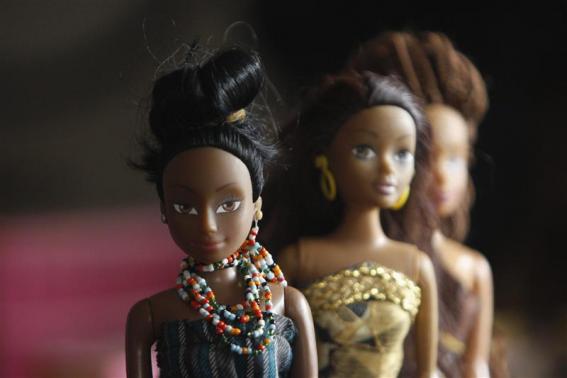(Reuters) – With a booming economy in Nigeria and more black children than anywhere else in the world, Taofick Okoya was dismayed some years ago when he couldn’t find a black doll for his niece.
The 43-year-old spotted a gap in the market and with little competition from foreign firms such as Mattel Inc, the maker of Barbie, he set up his own business. He outsourced manufacturing of doll parts to low-cost China, assembled them onshore and added a twist – traditional Nigerian costumes.
Seven years on, Okoya sells between 6,000 and 9,000 of his “Queens of Africa” and “Naija Princesses” a month, and reckons he has 10-15 percent of a small but fast-growing market.
“I like it,” said five year-old Ifunanya Odiah, struggling to contain her excitement as she checked out one of Okoya’s dolls in a Lagos shopping mall. “It’s black, like me.”
While multinational companies are flocking to African markets, Okoya’s experience suggests that, in some areas at least, there is still an opportunity for domestic businesses to establish themselves by using local knowledge to tap a growing, diverse and increasingly sophisticated middle class.
There’s no doubt about Nigeria’s economic potential. Economist Jim O’Neill has this year popularized it as one of the “MINT” countries – alongside Mexico, Indonesia and Turkey – that he sees as successors to the first wave of emerging markets he dubbed the BRICs (Brazil, Russia and India and China).
With around 170 million people, Nigeria is Africa’s most populous country by far, and its economy is growing at about 7 percent, vying with South Africa as the continent’s largest.
Several multinational firms have been here for years. Drinks group Diageo, for example, now sells more Guinness in Nigeria than in the beer’s traditional home market of Ireland. South African grocer Shoprite has seven profitable stores in Nigeria and plans to roll out hundreds.
While Western economies struggle, the appeal of emerging markets for toymakers is clear. Between 2006 and 2011, developed countries saw toy sales grow just 1 percent a year, versus 13 percent in emerging markets, according to Euromonitor data.
But in Nigeria, basic goods aside, consumerism is in its infancy, creating opportunities for entrepreneurs.
“When it comes to sectors like spirits or beer, or even cement, all the international players are already there,” said Andy Gboka, London-based equity analyst at Exotix LLP Partners.
“Other sectors, such as toys or less-developed industries, provide a huge potential for local companies.”
TAILORED TO LOCAL TASTES
Mattel, the world’s largest toy company, has been selling black dolls for decades, but said its presence in sub-Saharan Africa was “very limited”. Furthermore, the firm does not “have any plans for expansion into this region to share at this time,” according to spokesman Alan Hilowitz.
There are good reasons for foreign companies to be cautious.
While Nigeria sees thousands of births every day, two thirds of children are born into families unable to afford anything off the shelves of most toy shops.
Multinationals also cite poor infrastructure and corrupt port authorities as reasons for steering clear.
South Africa’s Woolworths pulled out of Nigeria last year, blaming supply chain problems, though analysts said it also misread the local clothes market.
The longer companies such as Mattel wait, however, the more time Okoya has to build his business and shape consumer tastes.
At a small factory in Lagos’ Surulere suburb, his workers stitch brightly patterned West African fabrics into miniature dresses and “geles” – traditional head gear.
Nigeria’s three largest ethnic groups of Yoruba, Igbo and Hausa are represented in the “Queens of Africa” range so far, highlighting the growing sophistication of consumers – and the need to tailor products to local tastes.
The dolls go for between 1,300 Nigerian naira to the special edition 3,500 naira ($22), while cheaper “Naija Princesses” sell for 500 to 1,000 naira apiece. Okoya makes a profit margin of about one third, and as well as selling at home, is increasingly shipping to the United States and Europe.
He plans dolls from other African ethnic groups, and is in talks with South Africa’s Game, owned by Massmart, a part of Wal-Mart, to sell to 70 shops across Africa.
Like Barbies, Okoya’s dolls are slim, despite the fact that most of Africa abhors the Western ideal of stick-thin models.
Okoya said his early templates were larger bodied, and the kids didn’t like them. But he still hopes to change that.
“For now, we have to hide behind the ‘normal’ doll. Once we’ve built the brand, we can make dolls with bigger bodies.”
via Reuters

